Final Fantasy XIII — Pulsating Cocoon
 Final Fantasy XIII is the most honest Japanese RPG ever. This is bound to tick off quite a few people.
Final Fantasy XIII is the most honest Japanese RPG ever. This is bound to tick off quite a few people.
The JRPG genre has always prided itself with a faux sense of exploration and non-linearity in its most common overall design. A problem arises when so few of them actually embrace that, giving the player time to realize that they’re actually just going through the motions as the game’s designers see fit. And it only got worse in the 32-bit era, when developers started to pad out the length with plenty of “features” that really didn’t contribute to the overall game. You could also blame that on the inability to move as fast within a 3D space as opposed to a 2D one, sure, but the sheer excess was actually there. And it’s mostly a complete waste of time, a commodity that’s lessened as a whole generation of gamers are coming of age.
The immediately laudable aspect of FFXIII is that it doesn’t waste your time. Final Fantasy X was the first to get rid of the overworld in the direct franchise, and most RPGs followed in its footsteps. That’s mainly because it’s pretty expensive to create a realistic, sprawling overworld in 3D in the advent of more realistic graphics, and going HD certainly didn’t help. FFXIII follows in its footsteps, but streamlines the experience even further.
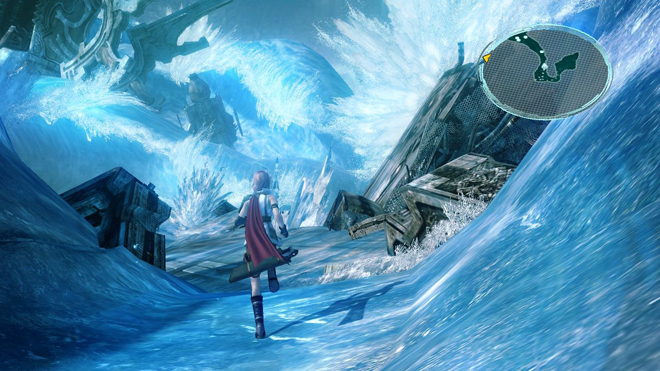 They may be straight lines but damn they look nice.
They may be straight lines but damn they look nice.Dungeons no longer appear to be the lengthy, sprawling environments littered with numerous paths you’ve come to know; a common point of contention among fans of the series upon comparing them to older games in the franchise. That’s not quite true, and they really only appeared to be large environs by design; dungeons in the older games were mostly straight lines as well. It’s just that FFXIII exacerbates how notable that actually is. And this game has a much faster way of doing that.
The lack of towns is also a common complaint. Keep in mind that your party consists of fugitives, meaning going to a town would be the last thing they should do. Also, it’s not like FF games were known for having the greatest towns, because they didn’t.
Most of its linearity, like your average JRPG, is done to tell its story, which itself is actually pretty good. Don’t rule out any plot holes, though, because there are plenty. There’s also some questionable scriptwriting, but it thankfully doesn’t get in the way too badly. It tells the story of an ex-solder (a real ex-soldier, thank you) named Lightning, who was a sergeant of the Guardian Corps just before the tale began. She has her own motives for desiring to approach Anima, like most of the other party members. The game begins, right in the middle of the action, with Lightning and Sazh, the latter an afro-donning gun-toting guy with a young Chocobo living in his hair.
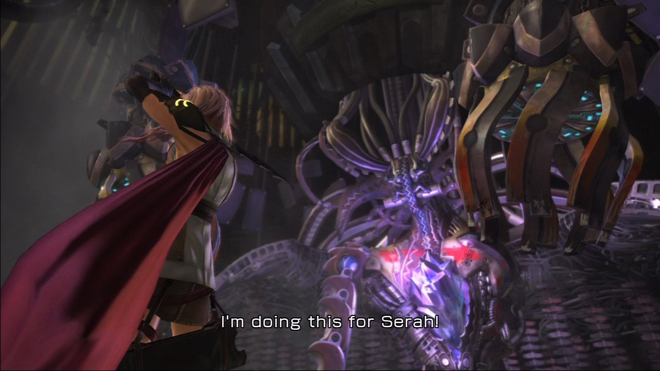 Some great direction in the cut scenes.
Some great direction in the cut scenes.And the entire tale is delivered with some stellar voice acting as well, and from voice actors you’d probably recognize. Ali Hillis, who Mass Effect players will recognize as Dr. Liara T’Soni, provides the voice of Lightning. The omnipresent Troy Baker provides the voice of Snow. Both Hope and Sazh’s voice actors have done plenty in works that you might have seen if you’re reading this, voice acted or not. And while Vanille’s voice actress, Georgia Van Cuylenburg, doesn’t seem too great from the beginning, she improves greatly as the game goes along. (Though that might have been deliberate.) Also, some of the minor voices from Cocoon’s citizens may sound very familiar if you play a lot of RPGs or watch anime.
Given what points the developers could immediately focus on, the background artists were able to give plenty of detail to every specific aspect, and man does it show. Usually when a game is stuck in limbo for a good while, the resulting product will look behind the times compared to the then-current commonly accepted definition of state-of-the-art (see Final Fantasy XII and Dragon Quest VII for examples). But FFXIII thankfully doesn’t suffer from this, and the amount of attention to detail given to almost every background is staggering. Look up in the sky to see clouds roaming past, along with some random flying objects. Your reflection can also be seen within the water in certain places as well. And the view distance is so amazing that you’ll easily find yourself staring at some of the environments for a good while.
You could describe FFXIII’s battle system as being and enhancement of the usual Active Time Battle system found in most games in the franchise, but referring to it as merely that is seriously selling it short. It’s the perfect evolution of what was found in previous games, especially Final Fantasy X-2, but now it’s much more intense. You’re still required to use physical attacks on certain enemies, and magic on others. And there’s no job switching purely for the gimmick (or, you know, blatant fanservice) on the fly here, of course, because it’s substituted for Paradigm Shifting: a necessary maneuver used to switch to different roles for each character currently in battle.
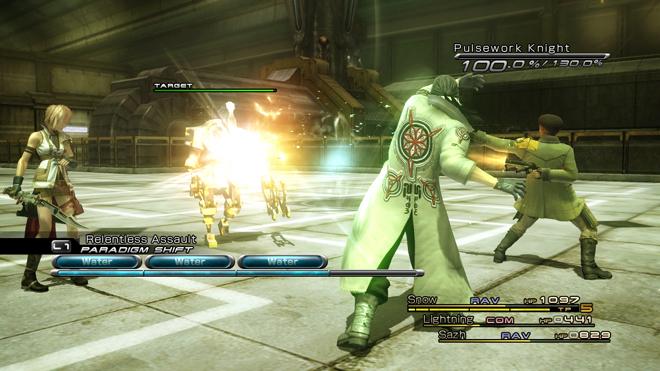 The part when you first encounter enemies may be basic…
The part when you first encounter enemies may be basic… And it’s something you’ll definitely need to master, because this game gets pretty tough in its latter half. It pits you in many predetermined teams earlier in the game, but while playing it, you’re likely to think it’s just being done for the sake of telling an important story. Not to say that’s not part of it, but it helps in teaching you how to manage all of its gameplay systems efficiently; ingraining in you’ll head that you’ll need to grasp the knowledge of its innards. You’re also allowed to make specific Paradigms to use them as you see fit. You can make six total, enough to have some made specifically for attacking, defense, and magic. The easiest way to find enemy weaknesses is to use Libra to find out what you need to do to make an effective strategy.
You’ll start off with every character only being able to have two ATB slots, with some techniques taking up more than one slot – usually techniques that hit multiple targets. That number increases as you go along in the game, allowing for more variety in your attacks for each character. As your characters develop, it will be easier to Stagger an opponent for larger damage opportunities. Sometimes you’ll need to Stagger them to actually hurt them.
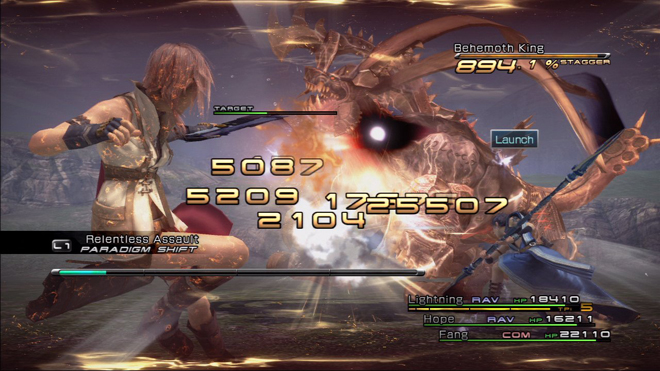 …but it’s when you Stagger them that the situation begins to turn in your favor.
…but it’s when you Stagger them that the situation begins to turn in your favor.Everything with the battle system works out great for the most part, but it’s not without its problems. You can sit down and carefully make a number of Paradigms in a list that suit your play style, but god forbid you happen to switch a character out – or worse, when the game switches them out automatically because of a story event – because it will erase every one you made. Also, while you control the leader in battle, the AI will control your accomplices. They’re m
ostly competent, but they’re not prone to some silly mistakes like constantly using high level magic when lower level magic would be fine and more efficient, or using less important buffing and debuffing for specific battles.
Also, in a very Megaten-esque twist, if your leader is defeated in battle, the game is over. Thankfully the game allows for quick restarts if you lose, but sometimes the enemy can arbitrarily target the leader for a quick end to the battle, which can be frustrating if it’s a boss battle that will last for at least eight minutes or more. Also, it’s a shame that you can only use the leader’s summon – known in this game as an “Eidolon” – in any given battle.
The game overall develops in a way to help you get to know every character in and out of battle, as somewhat explained before. While starting off slow is OK for the purposes telling its story and introducing you to its mechanics, it also manages to make this one of the least replayable games in the franchise. When you replay a game, you might want to do it to try something different the second time around, but there’s minimal experimentation to be made here until around 20 hours in.
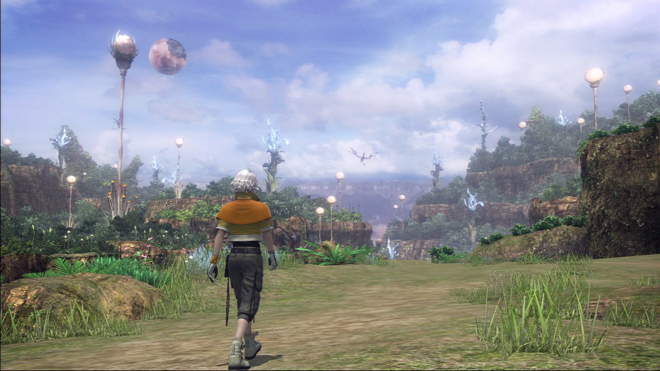 The environments look nice by themselves, but the music further enhances their immersion factor.
The environments look nice by themselves, but the music further enhances their immersion factor.The music is also of the most beautiful material ever heard in a Final Fantasy game, or a video game, for that matter. Masashi Hamauzu has done plenty of good music in his time at Square Enix (and Squaresoft), but he’s really outdone himself here. There are plenty of tunes that use his trademark piano and violin to full effect, and there are plenty of tracks with lyrics that sound great – though that last one won’t be out of place of anyone who’s played a Megaten game.
Final Fantasy XIII is not geared towards everyone’s taste, as you’ve undoubtedly seen if you frequent a few corners of the internet. It is, however, a neat experiment and an endearing take on the JRPG genre. The Final Fantasy franchise keeps itself relevant by implementing new features in every installment, to the pleasure or chagrin of its fans; and it’s precisely what keeps each game interesting. You may not like this game, but it will definitely be an experience to be remembered for years.

Excellent review! I couldn’t have done better myself. ^^
Thanks man! Looking forward to yours when you’re finished.